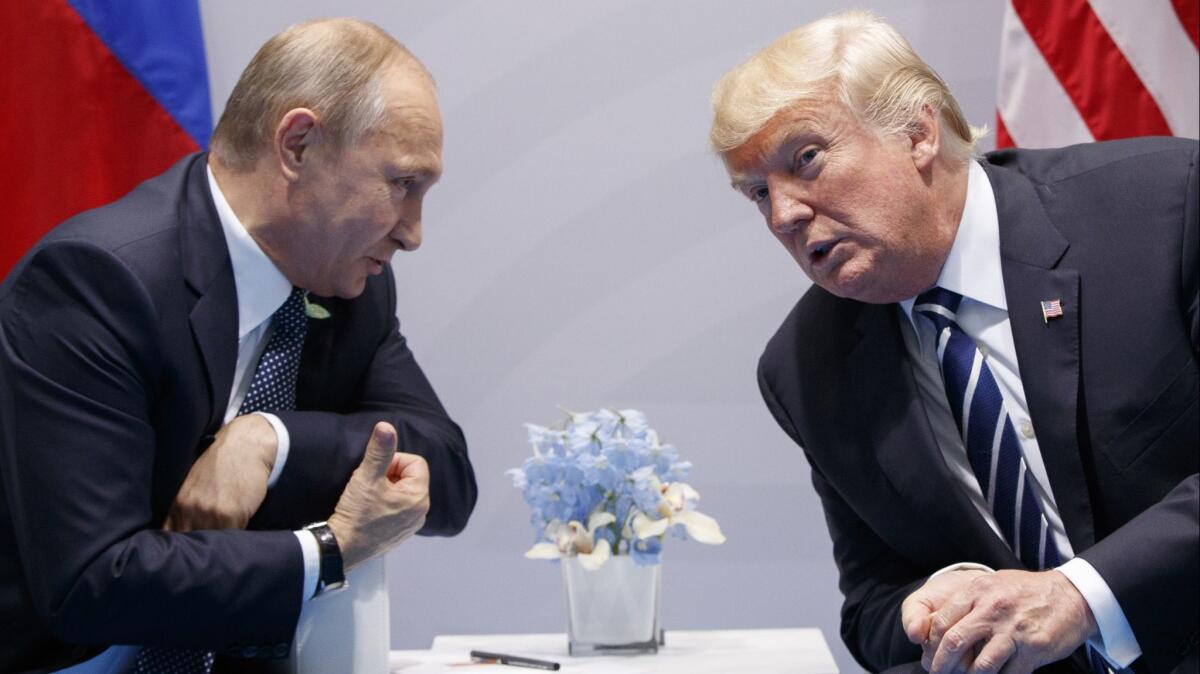Editorial: Will Trump speak truth to Putin? We have our doubts

- Share via
Even during the Cold War, it made sense for U.S. presidents to meet with leaders of what was then the Soviet Union. Personal contact between the president of the United States and the president of the Russian Federation can likewise be productive; Russia and the United States need to deal with each other on issues such as Syria, North Korea, nuclear arms control and Ukraine. So why are we apprehensive about the planned meeting of President Trump and Vladimir Putin in Helsinki on July 16?
One reason is that this is a president who likes to improvise in international (and other) encounters. But our greater concern is that Trump might not be willing to confront Putin over Russia’s attempts to undermine the NATO alliance, or its efforts, past and present, to interfere in the American election process.
Trump will meet Putin after attending the North Atlantic Treaty Organization summit in Brussels, at which he is likely to hear that America’s allies are anxious about his courtship of Putin.
As part of Putin’s effort to reestablish his country as a world power, Russia has built up its armed forces, annexed Crimea, and engaged in massive military exercises that have alarmed NATO member states in the Baltic and Eastern Europe. Yet Trump often has seemed insufficiently critical of Russia’s assertive policies — and grudging in his support for the NATO alliance, which he described as “obsolete” during the 2016 campaign. (As president, he said that “it’s no longer obsolete.”)
Enter the Fray: First takes on the news of the minute from L.A. Times Opinion »
Earlier this month, as he was traveling to Quebec for the G-7 meeting, Trump complained that Russia wasn’t participating in the conference of countries with advanced economies. “Why are we having a meeting without Russia being in the meeting?” he asked. The answer, of course, is that Russia was expelled from what was then the G-8 after it took Crimea from Ukraine and annexed it. (Trump suggested that blame for the 2014 Russian annexation actually belonged to former President Barack Obama.)
Trump has continued to berate European members of the alliance, including Germany, for not spending enough on defense, a failing he links to what he sees as unfair trade practices by the European Union. Earlier this month he tweeted: “We protect Europe (which is good) at great financial loss, and then get unfairly clobbered on Trade. Change is coming!”
That’s exactly what some of America’s allies are afraid of. NATO Secretary-General Jens Stoltenberg said on Thursday that the planned Trump-Putin summit is “a sign of strength” and that it’s “totally in line with NATO policies to talk to Russia.” He added that he was “absolutely confident and certain that President Trump is committed to NATO.” But Stoltenberg’s predecessor, Anders Fogh Rasmussen, who is perhaps less constrained by diplomatic tact, told Time magazine last week that Trump’s recent actions have “left the friends and allies of the United States wondering, who is the leader of the democratic world?”
While Europeans are primarily concerned about whether Trump would confront Putin about Russia’s military policies, many Americans place priority on Trump warning Putin to stop Russian meddling in Americans elections — activity that U.S. intelligence officials have told Congress is still a threat. But that seems a fond hope.
Under our Constitution, it’s the president who ultimately drives foreign policy.
John Bolton, Trump’s national security advisor, said that Trump likely would raise the election-meddling issue with Putin. But it’s hard to believe the president will be very insistent. Trump long has been reluctant to acknowledge the fact that Russia interfered in the 2016 election to help him because he sees it as undermining the legitimacy of his victory. And he’s still in denial. On Thursday, in a Twitter post that went on (of course) to attack former FBI Director James B. Comey and Hillary Clinton, Trump reiterated credulously: “Russia continues to say they had nothing to do with Meddling in our Election!”
Some might argue that Trump’s comments about NATO, which arguably reflect his “America First” approach to foreign affairs, as well as his see-no-evil attitude toward Russia’s election meddling, don‘t matter — because the rest of the U.S. government pursues a policy toward Russia that is rooted in reality. There is some truth to that argument: For example, Secretary of Defense James N. Mattis recently warned in a speech that “Putin seeks to shatter NATO.” And the Pentagon has matched words with actions: The U.S. recently led a major NATO military exercise in Poland and the Baltic States.
Yet Americans can derive only so much consolation from the fact that others in the Trump administration see Russia and Putin with clear eyes. Under our Constitution, it’s the president who ultimately drives foreign policy. What Trump says — and doesn’t say — to Putin still matters.
Follow the Opinion section on Twitter @latimesopinionand Facebook
More to Read
A cure for the common opinion
Get thought-provoking perspectives with our weekly newsletter.
You may occasionally receive promotional content from the Los Angeles Times.










